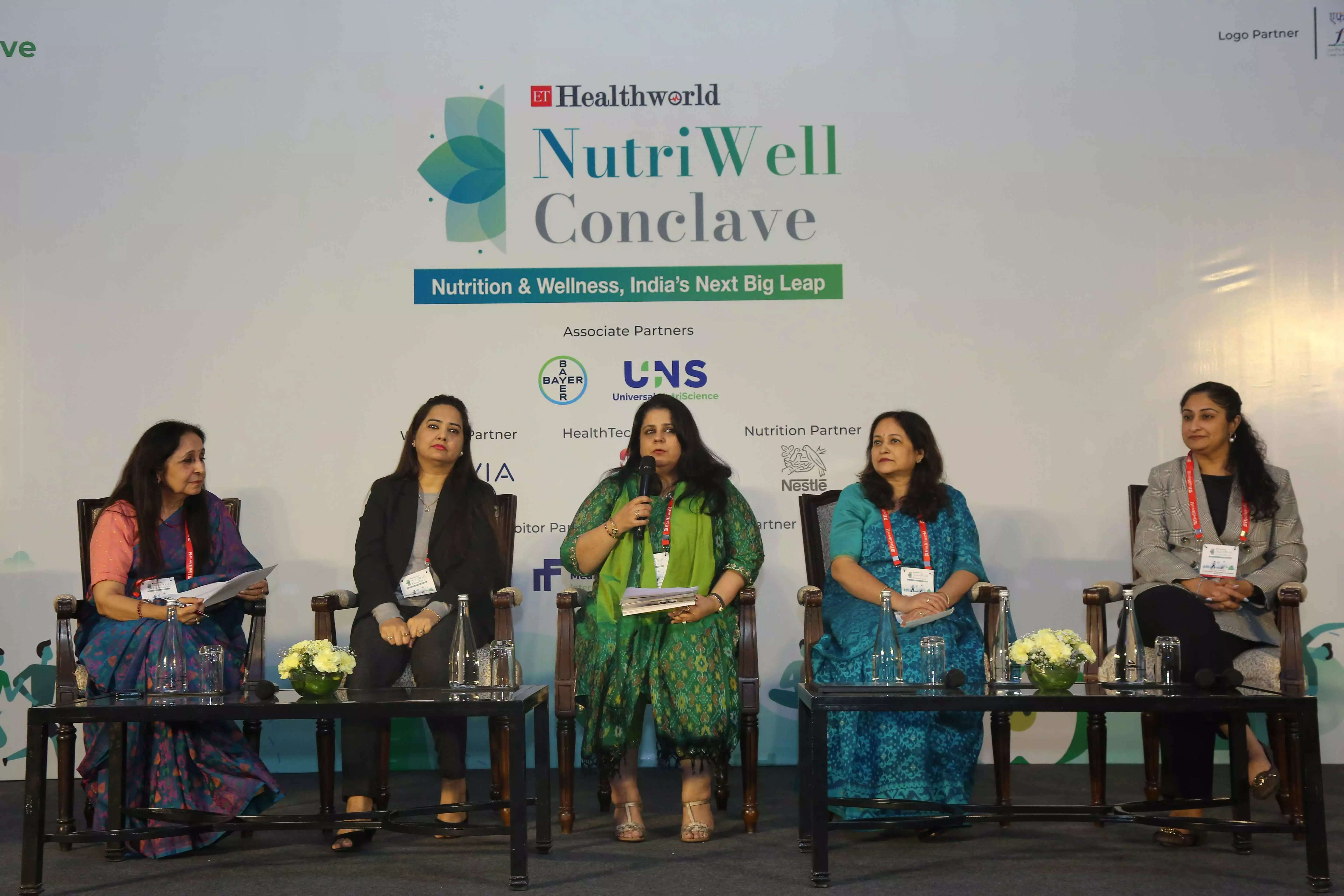
By Rashmi Mabiyan and Shilpasreee Mondal
New Delhi: As more people prioritize their health and well-being, over-the-counter (OTC) nutraceuticals have gained popularity as a convenient way to support overall wellness and prevent illness. These supplements, which blend the benefits of nutrition and pharmaceuticals, have captured the attention of consumers seeking easy solutions for maintaining their health. However, with the growing interest in the nutraceutical industry, questions about their effectiveness, safety, and proper usage are becoming increasingly relevant.
At the ETHealthworld Nutriwell Conclave, a panel discussion on the “Role of OTC Nutraceuticals for Personalized Preventive Healthcare: Do’s and Don’ts” brought together key experts in the field. The panel featured RD Geeta Buryok, Head of Clinical Nutrition & Dietetics at Max Hospital, Shalimar Bagh; Dr.Pulkit Mathur, Professor in the Department of Food & Nutrition, Food Technology at Lady Irwin College, University of Delhi; Bhakti Samant, Chief Dietician at Kokilaben Dhirubhai Ambani Hospital; and Shilpa Wadhwa, Head of Nutrition, Health & Wellness at Nestle India. Dr. Anita Jatana, Consultant Dietetics at Indraprastha Apollo Hospital, expertly moderated the session.
Dr. Jatana said, “Let food be thy medicine, and medicine be thy food,” emphasizing the continued relevance of this idea in the context of the nutraceutical industry. She acknowledged the industry’s exponential growth, with the global market now valued at $450 billion and India contributing $30 billion. Reflecting on the rising burden of diseases, she posed an important question: “If we can prevent illnesses without medications, expensive tests, or operations, wouldn’t we all choose that as the best option?”
The discussion then shifted to defining nutraceuticals, by providing an overview of these products. Geeta elaborated on the nature of
nutraceuticals, explaining that these are supplements available without a prescription, often derived from natural food sources. “These come in various forms, such as tablets, capsules, powders, and drinks,” she said. The term ‘nutraceutical,’ coined in 1989 by Dr. Stephen, reflects the combination of ‘nutrition’ and ‘pharmaceutical.’ The primary goal of nutraceuticals, as Geeta explained, is to support overall wellness, boost immunity, and help prevent chronic diseases, though they are not intended to treat specific illnesses. Examples of commonly used OTC nutraceuticals include dietary fibers, prebiotic and probiotic drinks, omega-3 fatty acid capsules, and curcumin.
In addition to their preventive benefits, nutraceuticals have the potential to address a variety of health concerns. Geeta discussed how they can fill nutritional gaps by providing essential vitamins and minerals missing from a person’s diet. She highlighted their role in immunity, pointing to supplements like Vitamin D combined with zinc or Vitamin C, which can significantly enhance the body’s ability to fight off infections. Furthermore, nutraceuticals such as dietary fibers, probiotics, and prebiotics contribute to
digestive health by improving the microbiome. Anti-inflammatory ingredients like curcumin and omega-3 fatty acids help manage conditions like arthritis and cardiovascular diseases, while magnesium-rich supplements support mental health by reducing anxiety and enhancing mood.The discussion also touched on the evolving landscape of consumer demands. Shilpa Wadhwa emphasized consumer priorities shifting toward healthier, more holistic lifestyles. “Consumers now seek products with functional benefits, often fortified with
nutrients to fill dietary gaps,” Wadhwa explained. She noted that there is a growing demand for foods that are free from ingredients like sugar and salt, reflecting a broader desire for healthier options. The rise of movements such as veganism and the increasing popularity of natural and organic products indicate that consumers are more mindful of the ingredients in their diets. “Luckily for us, the nutraceutical industry is evolving to meet these needs with targeted benefits and effective dosages,” Wadhwa concluded,
highlighting that nutraceuticals adapt to these changing preferences. However, the growing reliance on nutraceuticals also brings potential risks, especially when they are used improperly.
Dr. Pulkit Mathur highlighted the danger of assuming that nutraceuticals can replace a balanced diet. “Human nature is such that you’re always looking out for this one magic pill or easy way out,” she remarked. While nutraceuticals offer convenience, Dr. Mathur
cautioned that they are not meant for long-term, unchecked use. “Most nutraceuticals are for short-term use only. If consumed excessively or without proper guidance, they can lead to toxic or adverse effects,” she warned. She stressed the importance of monitoring and seeking medical supervision to avoid risks associated with prolonged use.
Bhakti Samant addressed the challenges surrounding OTC nutraceuticals. While these products are easily accessible, she pointed out that they are not prescribed and can be easily misused. “These products can be purchased online or in stores, making them prone to misuse, overuse, or underuse,” Samant explained. She highlighted the lack of clinical validation in many nutraceuticals, noting that the government is working on improving quality regulation but that further attention is needed. Additionally, the marketing of these products can create confusion, as companies often make exaggerated claims about their efficacy. Samant shared an example of a young actor who, despite using high-quality supplements, experienced fatigue and inefficiency due to improper dosage and lack of professional guidance. “Even the best nutraceuticals will fail if consumed in incorrect doses or without addressing individual needs,” Samant concluded, emphasizing the importance of proper medical consultation.
The panel also discussed the current state of research in the nutraceutical industry. Shilpa Wadhwa highlighted the distinction between well-established science and emerging research in the field. “Certain nutritional supplements, such as those containing vitamins, minerals, and fibers, have been extensively studied and have robust scientific backing,” she said. These ingredients are widely recognized for their benefits when consumed at the correct dosage. However, she noted that the science behind botanicals,
herbal supplements, and Ayurvedic ingredients is still developing. “Some ingredients, such as curcumin, have well-established research backing their efficacy, but many herbal supplements are still under study,”she remarked. Wadhwa emphasized that the efficacy of these ingredients may also depend on specific consumption methods, dosages, and timing, as outlined in Ayurvedic practices.
As their popularity grows, it is crucial to understand the science behind these products and use them responsibly. With continued research and proper guidance, nutraceuticals can become a valuable tool in promoting better health and well-being for individuals seeking alternative ways to manage and improve their health.







